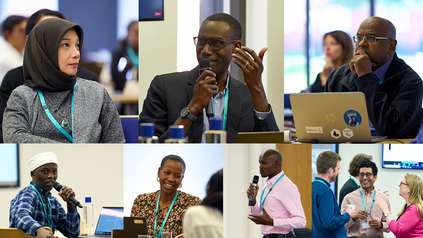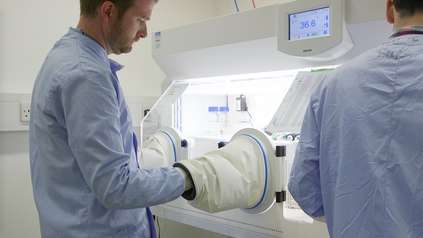Climate change impacts on gut microbiome explored in new study
New research aims to understand how climate change is affecting human health in Bangladesh. As part of the new project, funded by Wellcome, researchers at the icddr,b in Bangladesh are collaborating with the Wellcome Sanger Institute to understand how bacteria living in the gut and the environment (microbiomes) are impacted by global heating. The findings will help the world understand what is needed most to counter the effects of climate change, especially in vulnerable communities such as these.
The area under study in Chakaria, southern Bangladesh, is unique. In 1999, an icddr,b health and demographic surveillance site was established1. For the past 20 years, researchers based there have collected health, nutrition, mobility and demographic data from 85,000 people living in 17,000 households in the region.
The area that the Chakaria site covers includes coastal lowlands, where land and the fresh water aquifers beneath are becoming infiltrated with salt water as sea levels rise. Over the last few years, the icddr,b team has documented rising rates of gastrointestinal diseases, kidney disease, hypertension, and a decrease in childhood nutritional status in the region2. Hypertension is a risk factor for issues in pregnancy, and icddr,b researchers have found that miscarriage rates are increasing in the area, and are correlated with the amount of salt contamination in drinking water3. All of these worsening health issues are most acute closest to the coast, or where drinking wells have been most infiltrated by salt water. Declining health has been directly linked to rising sea levels in the area.
The new project funded by Wellcome will create a Climate and Health Hub at the icddr,b Chakaria site. Over a period of three years, researchers will collect data about the bacteria living in the gut and environment, along a gradient of drinking water with increasing salt concentration. At the same time they will also gather a detailed understanding of how people live under these conditions, including their diet, and patterns of health. Environmental measurements, such as temperature, will be collected too.
These data will be integrated with existing health surveillance data from the Chakaria site. The teams hypothesise that rising sea levels cause negative health impacts at least in part owing to changes in the gut microbiomes of people affected by saltwater intrusion. They will investigate how the changing patterns of gut pathogens and non-pathogenic bacteria in these microbial communities influence health and disease. The aim is that the information from the study will inform future interventions and treatments.
Dr. Syed Manzoor Ahmed Hanifi is the Acting Senior Director of the Health Systems and Population Studies Division at the icddr,b in Bangladesh, and leads the health and demographic surveillance work in Chakaria.
“We want to understand what the main problem is. Is it the increased salinity of drinking water from wells? Or is it that unusable wells force people to drink surface water, which may be contaminated with pathogens? Or could it be the increased temperatures, the increased frequency of cyclones and heavy rains, or the flooding that contaminates surface drinking water? Or is it down to a change in microorganisms present in the area? By linking microbiome and environmental data together with our existing health and demographic measurements spanning 20 years, we will provide evidence to inform decision-making around mitigations for the future.”
Dr Syed Manzoor Ahmed Hanifi,Acting Senior Director, Health Systems and Population Studies Division, icddr,b
Dr Hanifi will be working with John Sillitoe, Director of the Genomic Surveillance Unit, and Professor Nick Thomson, Head of Parasites and Microbes Programme at the Wellcome Sanger Institute. The Sanger Institute teams will use metagenomic approaches on environmental and human samples, including stool, from the study region. Metagenomic sequencing data will be analysed to assess the amounts and types of bacterial species in the gut and gain an understanding of changing patterns of exposure to bacteria that cause disease. The Sanger Institute teams will establish bioinformatics methods and pipelines to process and interpret the genomic data.
“Metagenomic approaches will allow us to understand how climate impacts are affecting our ability to ward off infection or is increasing our exposure to deadly pathogens. When everything is changing our gut bacteria are part of our defence against disease, if this is compromised we would expect there to be significant health consequences. Given recent advances in our understanding of microbiomes, consequences that can be potentially remedied. On top of this, we will also establish a strategic relationship between our institutes and share capacity through training – the icddr,b with expertise in epidemiology and population health, and the Sanger Institute with expertise in genomics, metagenomics and evolutionary biology.”
Professor Nick Thomson,Head of Parasites and Microbes at the Wellcome Sanger Institute
“I want to see evidence-based policy, not expert opinion-based policy. I strongly believe that we need evidence to understand exactly how climate change is affecting health, to understand what people’s needs are, and to understand which interventions and policies are required.”
Dr Syed Manzoor Ahmed Hanifi
The researchers aim to provide a population scale snapshot of the impacts of climate on our health. In doing so they will curate and share a world-class resource of longitudinal biological, climate, and population-based health data to enable future climate-related studies in a unique setting.





